An Indigenized code of conduct for visitors to the traditional lands of the Lutsel K'e Dene First Nation
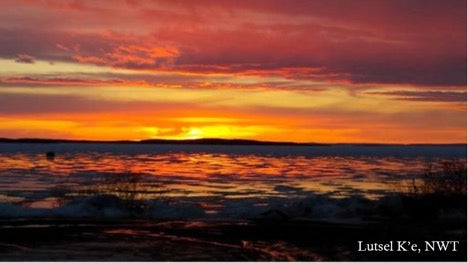
Report on master's thesis research associated with the project Picturing the Thelon River: Restor(y)ing Denesoline relations en route to the headwaters.
- Project overview
- Developing the code of conduct - A community narrative
- A code of conduct for visitors
- Acknowledgements
Project overview
This report highlights the outcomes of Ally Holmes’ master’s thesis research study. The study was carried out by researchers from the University of Waterloo in Ontario and in collaboration with the Lutsel K’e Wildlife, Lands, and Environment Committee (WLEC). It was completed between 2014 and 2015 as part of a broader project entitled Picturing the Thelon River: Restor(y)ing Denesoline relations en route to the headwaters.
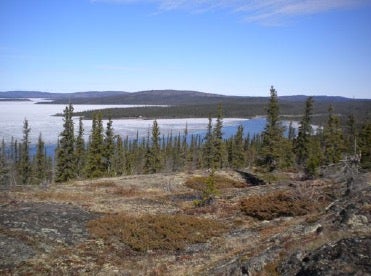
The Lutsel K’e Denesoline are committed to managing and protecting the entirety of their homeland. This includes the community itself, the Thelon River basin, and Thaidene Nene, places that attract different kinds of visitors such as government and mining officials, adventure tourists, researchers, and other Indigenous peoples. The behaviours of visitors travelling in Lutsel K’e territory can sometimes conflict with Dene expectations and values. In order to address this conflict, participating community members were asked to share stories about their experiences with visitors and their expectations for visitor behaviour in Denesoline territory. From these stories, a code of conduct for visitors was developed that outlines expected behavior and also the reasons and meanings behind those expectations.
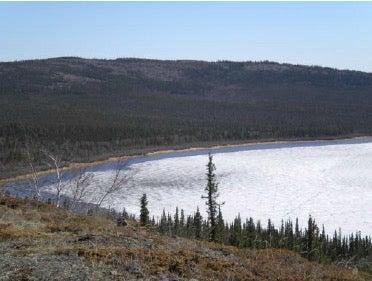
This study was developed during a research-planning workshop in December 2013. Dr. Bryan Grimwood, and Waterloo graduate students Lauren King and Ally Holmes, worked with WLEC to outline objectives and expectations for participatory research. Ally and local research coordinator, Terri Enzoe, collected ‘data’ (e.g., stories) for this reported project component during a five week span in April and May of 2014. Research involved interviews with 12 Lutsel K’e representatives (e.g., land managers, land users, elders, youth).
All participants were asked to share stories about their experiences of and expectations for visitor behaviour, whether within the community of Lutsel K’e or in the broader Denesoline territory.
These interviews were followed by a community workshop with members of the WLEC to collaboratively analyze the information shared during participant interviews. The research process was guided by three objectives:
- to document the range of negative and positive experiences that the participants (e.g., youth, adults, elders in Lutsel K’e; land users, land managers) have had with visitors to their traditional lands
- to explore how the Lutsel K’e Denesoline expect visitors to behave on their land, and why those expectations exist
- to develop a tangible code of conduct for visitors to the area, which can function as a mechanism for land governance and management.
Developing the code of conduct - A community narrative
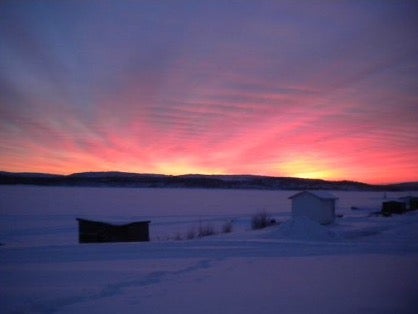
The stories that were shared during participant interviews and the community workshop were combined to create a ‘community narrative’ of respect, shared from the researcher’s perspective as a non-Indigenous researcher. Based on the key themes and ideas shared in the individual narratives, the community narrative highlighted multiple dimensions of respect, such as showing respect for the environment and Denesoline place in their traditional territory, as well as the relationship between respectful behaviour, safety on the land, and the potential for tourism and economic development. In an attempt to engage with Denesoline voices and perspectives as much as possible, direct quotes from participant stories were frequently used.
The narrative in its entirety can be found in Ally’s master’s thesis, a copy of which will be available to the community in the Traditional Knowledge Archives. In short, the narrative consists of the following sections:
- Setting the stage: "It’s so beautiful here" – an overview of the types of visitors to Lutsel K’e and Denesoline territory and why they visit
- Exploring the conflict – a look at examples of disrespectful visitors, colonialism and its impacts, and the ongoing struggle for Denesoline self-determination and land governance.
- The resolution – expectations for respectful visitor behaviour, how to communicate those expectations, and why that is important
- Respecting us (Denesoline), our home, our land
- Respectful visitors are welcome to visit – exploring the potential for tourism and community development that celebrates Denesoline knowledge, culture, and ownership of territory
From this community narrative, a code of conduct was developed which summarizes the broader narrative in a way that is easily accessible for users, providing instruction for expected behaviour and reasons for that instruction. It is through interpretation, or the education and sharing of ideas and reasoning for expectations of behaviour, that a code of conduct can be more effective, especially given that it is a voluntary guideline. The next section presents the code of conduct for visitors to Denesoline territory, and is shared with the community as a tool that can be distributed to visitors either electronically (e.g. Thaidene Nene website) or in hardcopy (e.g., brochures in Air Tindi Airport, Thaidene Nene visitor centres). An initial draft of this code was shared with WLEC members during Bryan Grimwood’s research reporting visit to Lutsel K’e from May 3-8, 2015. At this time, WLEC shared their feedback, comments, and suggestions for the code of conduct, all of which was integrated into this final draft.
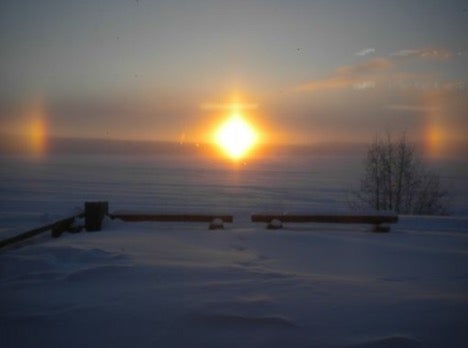
A code of conduct for visitors
"This sacred land is our home. Respectful visitors welcome":
A code of conduct for visitors to the ancestral territory of the Lutsel K’e Dene First Nation.
Welcome to the territory of the Lutsel K’e Dene First Nation! Our land is beautiful and our water is clean – and we are committed to keeping it that way. This set of guidelines has been developed to educate visitors about our expectations for respectful travel within our ancestral territory. Please – come visit and enjoy, and do so in a way that honours our land, water, animals, and community members.
Here's how:
Acknowledgements
Thank you to the members of the Lutsel K’e Denesoline community for welcoming us to your home and supporting this research, as well as for sharing your stories and your beautiful territory. Special thanks to our local research coordinator, Terri Enzoe, and all of the interview and workshop participants!
Interview participants:
Sweetgrass Casaway, Herman Catholique, Joseph Catholique, Stephen Ellis, Gloria Enzoe, Pete Enzoe, Terri Enzoe, Damien Kailek, Jerry Lockhart, Brandon Michele, Two participants who wish to remain anonymous
WLEC workshop participants:
Sam Boucher, Joseph Catholique, Terri Enzoe, Ron Fatt, Mike Tollis
Thanks also to the Northern Scientific Training Program, the University of Waterloo’s Department of Recreation and Leisure Studies Department, the Aurora Research Institute, the Social Sciences and Humanities Research Council, Brian Green, Stephen Ellis, Peter Unger, and Mike Tollis.
For any questions or comments about this report:
Allison Holmes
aholm047@uottawa.ca
Bryan Grimwood
Department of Recreation and Leisure Studies
University of Waterloo
200 University Avenue W., Waterloo On N2L 3G1
bgrimwood@uwaterloo.ca
Report prepared by Allison Holmes and Bryan Grimwood, November 2015